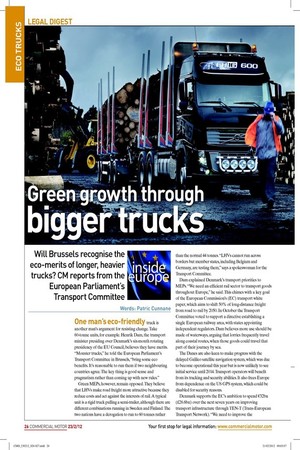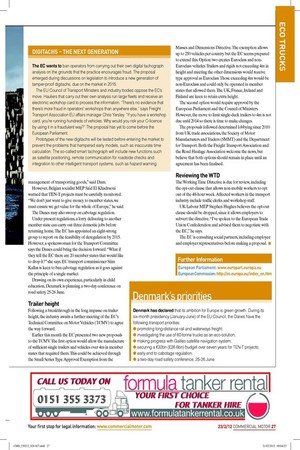Green growth through
Page 20

Page 21

If you've noticed an error in this article please click here to report it so we can fix it.
bigger trucks
Will Brussels recognise the eco-merits of longer, heavier trucks? CM reports from the European Parliament’s Transport Committee
Words: Patric Cunnane One man’s eco-friendly truck is another man’s argument for resisting change. Take 60-tonne units, for example. Henrik Dam, the transport minister presiding over Denmark’s six-month rotating presidency of the EU Council, believes they have merits. “Monster trucks,” he told the European Parliament’s Transport Committee in Brussels, “bring some eco beneits. It’s reasonable to run them if two neighbouring countries agree. The key thing is good sense and pragmatism rather than coming up with new rules.”
Green MEPs, however, remain opposed. They believe that LHVs make road freight more attractive because they reduce costs and act against the interests of rail. A typical unit is a rigid truck pulling a semi-trailer, although there are different combinations running in Sweden and Finland. The two nations have a derogation to run to 60 tonnes rather than the normal 44 tonnes. “LHVs cannot run across borders but member states, including Belgium and Germany, are testing them,” says a spokeswoman for the Transport Committee.
Dam explained Denmark’s transport priorities to MEPs. “We need an eficient rail sector to transport goods throughout Europe,” he said. This chimes with a key goal of the European Commission’s (EC) transport white paper, which aims to shift 50% of long-distance freight from road to rail by 2050. In October the Transport Committee voted to support a directive establishing a single European railway area, with states appointing independent regulators. Dam believes more use should be made of waterways, arguing that lorries frequently travel along coastal routes, when those goods could travel that part of their journey by sea.
The Danes are also keen to make progress with the delayed Galileo satellite navigation system, which was due to become operational this year but is now unlikely to see initial service until 2014. Transport operators will beneit from its tracking and security abilities. It also frees Europe from dependence on the US GPS system, which could be disabled for security reasons.
Denmark supports the EC’s ambition to spend €32bn (£26.6bn) over the next seven years on improving transport infrastructure through TEN-T (Trans-European Transport Network). “We need to improve the management of transporting goods,” said Dam.
However, Belgian socialist MEP Said El Khadraoui warned that TEN-T projects must be carefully monitored. “We don’t just want to give money to member states, we must ensure we get value for the whole of Europe,” he said.
The Danes may also swoop on cabotage regulation.
Under present regulations, a lorry delivering to another member state can carry out three domestic jobs before returning home. The EC has appointed an eight-strong group to report on the feasibility of deregulation by 2015. However, a spokeswoman for the Transport Committee says the Danes could bring the decision forward. “What if they tell the EC there are 20 member states that would like to drop it?” she says. EC transport commissioner Siim Kallas is keen to ban cabotage regulation as it goes against the principle of a single market.
Drawing on its own experience, particularly in child education, Denmark is planning a two-day conference on road safety 25-26 June.
Trailer height
Following a breakthrough in the long impasse on trailer height, the industry awaits a further meeting of the EC’s Technical Committee on Motor Vehicles (TCMV) to agree the way forward.
ject5CMO171111D002625 10/11/1114:53
Earlier this month the EC presented two new proposals to the TCMV. The irst option would allow the manufacture of suficient single trailers and vehicles over 4m in member states that required them. This could be achieved through the Small Series Type Approval Exemption from the Masses and Dimensions Directive. The exemption allows up to 250 vehicles per country but the EC seems prepared to extend this. Option two creates Euroclass and nonEuroclass vehicles. Trailers and rigids not exceeding 4m in height and meeting the other dimensions would receive type approval as Euroclass. Those exceeding 4m would be non-Euroclass and could only be operated in member states that allowed them. The UK, France, Ireland and Finland are keen to retain extra height.
The second option would require approval by the European Parliament and the Council of Ministers. However, the move to limit single-deck trailers to 4m is not due until 2014 so there is time to make changes.
The proposals followed determined lobbying since 2010 from UK trade associations, the Society of Motor Manufacturers and Traders (SMMT) and the Department for Transport. Both the Freight Transport Association and the Road Haulage Association welcome the news, but believe that both options should remain in place until an agreement has been inalised.
Reviewing the WTD
The Working Time Directive is due for review, including the opt-out clause that allows non-mobile workers to opt out of the 48-hour week. Affected workers in the transport industry include trafic clerks and workshop staff.
UK Labour MEP Stephen Hughes believes the opt-out clause should be dropped, since it allows employers to subvert the directive. “I’ve spoken to the European Trade Union Confederation and advised them to negotiate with the EC,” he says.
The EC is consulting social partners, including employee and employer representatives before making a proposal. ■
DIGITACHS – THE NEXT GENERATION
The EC wants to ban operators from carrying out their own digital tachograph analysis on the grounds that the practice encourages fraud. The proposal emerged during discussions on legislation to introduce a new generation of tamper-proof digitachs, due on the market in 2015.
The EU Council of Transport Ministers and industry bodies oppose the EC’s move. Hauliers that carry out their own analysis run large fleets and receive an electronic workshop card to process the information. “There’s no evidence that there’s more fraud in operators’ workshops than anywhere else,” says Freight Transport Association EU affairs manager Chris Yarsley. “If you have a workshop card, you’re running hundreds of vehicles. Why would you risk your O-licence by using it in a fraudulent way?” The proposal has yet to come before the European Parliament.
Prototypes of the new digitachs will be tested before entering the market to prevent the problems that hampered early models, such as inaccurate time calculation. The so-called smart tachograph will include new functions such as satellite positioning, remote communication for roadside checks and integration to other intelligent transport systems, such as hazard warning.
Further Information
European Parliament: www.europarl.europa.eu European Commission: http://ec.europa.eu/index_en.htm
Denmark’s priorities
Denmark has declared that its ambition for Europe is green growth. During its six-month presidency (January-June) of the EU Council, the Danes have the following transport priorities: ● promoting long-distance rail and waterways freight; ● investigating the use of 60-tonne trucks as an eco-solution; 1 ● making progress with Galileo satellite navigation system; ● securing a €32bn (£26.6bn) budget over seven years for TEN-T projects; ● early end to cabotage regulation; ● a two-day road safety conference, 25-26 June.












































